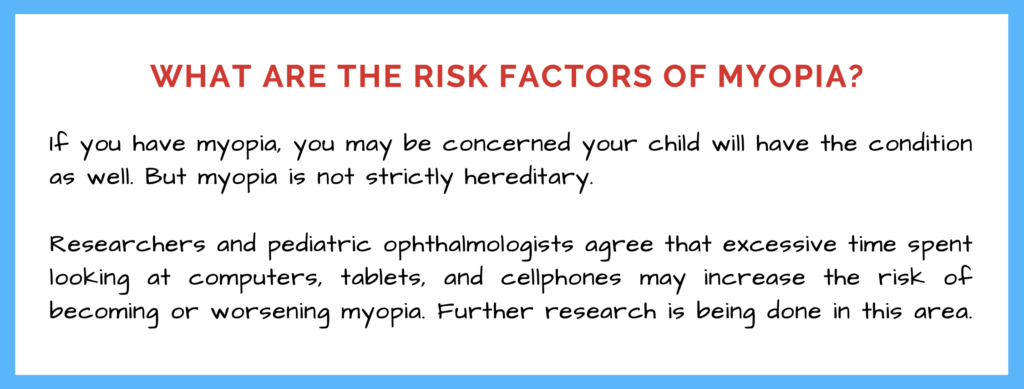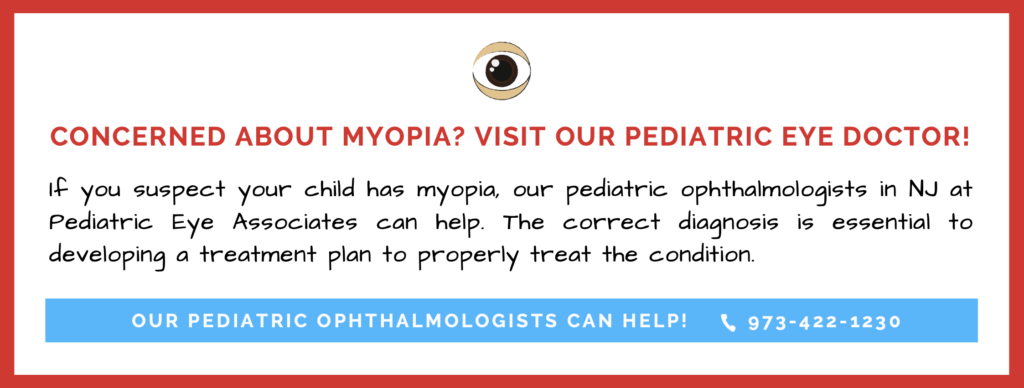Myopia, also known as nearsightedness, is common for many children. Myopia is a type of refractive error.
What is a refractive error? They are optical conditions that may prevent the eye from properly focusing on light, resulting in blurred vision. Along with myopia, hyperopia and astigmatism are types of refractive errors.
If you have myopia, you may be concerned your child will have the condition as well. But myopia is not strictly hereditary. There are likely multiple factors that contribute to myopia.
If diagnosed, your child is certainly not alone. By 2050, it is estimated that 50 percent of the world’s population will be myopic.
Children who have myopia as prescribed glasses or contact lenses. Once your child is a young adult, they may be a candidate for LASIK or other refractive surgery procedures.
What are the risk factors of myopia?
Hereditary is a risk factor, but does not guarantee your child will have myopia. If both parents have the condition, then your child may be at a higher risk.
Researchers and pediatric ophthalmologists agree that excessive time spent looking at computers, tablets, and cellphones may increase the risk of becoming or worsening myopia. Further research is being done in this area.
Because of the growing concern that myopia progresses even with treatment, researchers are developing new lens designs that may slow down the progression of nearsightedness in children.
Myopia tends to be progressive (get worse) during childhood and adolescence. Researchers are investigating specific types of eye drops, contact lenses and glasses lenses that may slow down the rate of myopic progression.
Many of these same researchers are investigating new lens designs to see if they can develop eyeglasses or contact lenses that can halt or slow the progression of nearsightedness in children.
Can I Reduce the Risk of Myopia?
Parents can reduce the amount of time children can watch TV or have access to digital devices. If they spend time in front of digital devices, encourage distance, so their eyes are not close to the screen.
Interestingly, recent studies support that spending more time outdoors may also prevent or reduce the progression of myopia.
Spending more time outdoors may help prevent or reduce the progression of nearsightedness in children. One Australian study found students who had the least amount of time outdoors had a greater risk of myopia.
A study in the UK supported these results. Researchers found a 2% drop in the risk of developing myopia for every hour the child spent outdoors each week. This equals an 18% reduction for every additional hour of daylight exposure.
No specific activity made a difference when researchers conducted the study. It did not matter what activity the child engaged in outdoors, so long as they spent time playing and exercising outside.
So bring your child outdoors every day to help their eyes to relax! Pediatric ophthalmologists recommend 60-80 minutes daily, if possible.
Concerned about Myopia? Visit a Pediatric Eye Doctor!
If you suspect your child has myopia, our pediatric ophthalmologists in NJ at Pediatric Eye Associates can help. The correct diagnosis is essential to developing a treatment plan to properly treat the condition.
Who are we at Pediatric Eye Associates? We are an exceptional team of pediatric ophthalmologists. Both Dr. Amy Lambert and Dr. Rachel Bloom are board-certified and fellowship trained.
We are experts in diagnosing and treating your child’s vision needs. We pride ourselves on results and on forming connections with families and their children. With this promise, our patients trust us for all of their children’s vision needs as they grow older.
Contact us if you’d like to schedule an appointment at our office or have any questions regarding Pediatric Eye Associates. We would be honored to welcome your family to our practice.
The material contained on this site is for informational purposes only and DOES NOT CONSTITUTE THE PROVIDING OF MEDICAL ADVICE, and is not intended to be a substitute for independent professional medical judgment, advice, diagnosis, or treatment. Always seek the advice of your physician or other qualified healthcare provider with any questions or concerns you may have regarding your health


